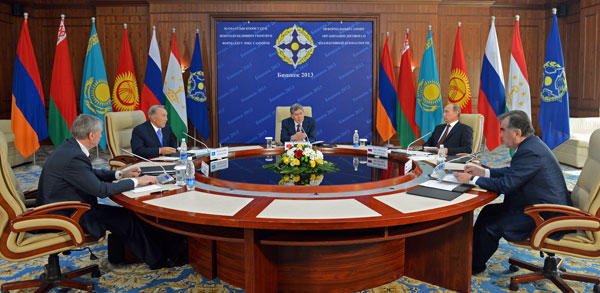On May 28, heads of four Collective Security Treaty Organization (CSTO) member states met in Bishkek to discuss regional security and Afghanistan today and post-2014, when the majority of foreign military forces are expected to leave that country.

L-R: CSTO Secretary General Nikolai Bordyuzha, Presidents Nursultan Nazarbayev, Almazbek Atambayev, Vladimir Putin and Emomali Rakhmon discuss regional security issues at their meeting in Bishkek on May 28.
Presidents Nursultan Nazarbayev of Kazakhstan, Almazbek Atambayev of Kyrgyzstan, Vladimir Putin of Russia and Emomali Rakhmon of Tajikistan focused on ways to improve mutual cooperation in fighting threats that may appear after the withdrawal of the International Security Assistance Forces (ISAF) from Afghanistan by the end of 2014. The presidents covered measures to strengthen the Tajik-Afghan border, the fight against drug trafficking out of Afghanistan, illegal migration and extremism.
Heads of CSTO member states also discussed further development of the CSTO system and strengthening its security potential, advancing joint operational and military training of CSTO forces, especially those connected with the Collective Rapid Reaction Force (CRRF). The Collective Rapid Reaction Force is meant as a conglomerate of member states’ forces to deal with emergencies, as well as military aggression, terrorism, organized crime and drug trafficking. It is envisioned as a military formation equipped with a single form of military equipment, as well as the common identification signs, and is meant to act under the flag of the CSTO.
“The presidents took the decisions to strengthen the borders of the CSTO countries in case of rising threats from Afghanistan and to strengthen military components of the CSTO member states,” CSTO Secretary General Nikolai Bordyuzha told the press following the meeting in Bishkek.
“Assistance will also be offered to the Afghan authorities in ensuring the stability in the region.”
It was also announced that military forces of CSTO member states would conduct several peacekeeping exercises in Russia and Belarus in 2014.
At the initiative of the Kyrgyz President, the four leaders also discussed an idea to build a Russia-Kazakhstan-Kyrgyzstan-Tajikistan railway line, Bordyuzha added.
“This issue does not directly touch upon the tasks of CSTO but still the presidents paid attention to this project. They agreed that they will instruct their respective agencies to work on economic and financial feasibility of this project,” Bordyuzha explained.
In addition to the four countries whose presidents participated in the Bishkek meeting, Armenia and Belarus are also CSTO members but their presidents did not come to the Kyrgyz capital. Uzbekistan has earlier suspended its membership in the CSTO so its president also did not attend.
A formal summit of heads of CSTO member states is traditionally held in Moscow at the end of the year.
From May 28 to 29, Russia’s President Vladimir Putin is to visit Astana to take part in the sitting of the Supreme Eurasian Economic Council along with President Nazarbayev and Belarus President Alexander Lukashenko. The Council is the supreme body of the Customs Union and the Common Economic Space of Russia, Belarus and Kazakhstan.
The agenda of the meeting includes further development of integration and the creation of the Eurasian Economic Union by January 1, 2015.
The event will also focus on the Customs Union functioning, further work to launch the Common Economic Space and the codification of international instruments, including working out a draft agreement on the Eurasian Economic Union.
After the three-way meeting, the heads of Belarus, Kazakhstan and Russia are to meet with the presidents of Ukraine and Kyrgyzstan, Viktor Yanukovich and Almazbek Atambayev.

